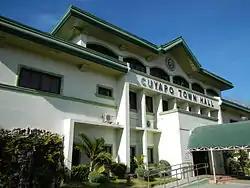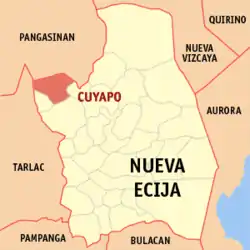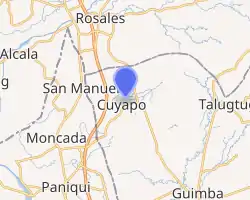Cuyapo
Cuyapo, officially the Municipality of Cuyapo (Pangasinan: Baley na Cuyapo; Ilocano: Ili ti Cuyapo; Tagalog: Bayan ng Cuyapo), is a 1st class municipality in the province of Nueva Ecija, Philippines. According to the 2015 census, it has a population of 65,039 people. [3]
Cuyapo | |
|---|---|
| Municipality of Cuyapo | |
 Municipal Hall | |
 Seal | |
 Map of Nueva Ecija with Cuyapo highlighted | |
OpenStreetMap 
| |
.svg.png.webp) Cuyapo Location within the Philippines | |
| Coordinates: 15°47′N 120°40′E | |
| Country | |
| Region | Central Luzon (Region III) |
| Province | Nueva Ecija |
| District | 1st District |
| Founded | 1859 |
| Barangays | 52 (see Barangays) |
| Government | |
| • Type | Sangguniang Bayan |
| • Mayor | Florida Paguio-Esteban |
| • Vice Mayor | Cinderella E. Ramos |
| • Representative | Estrellita B. Suansing |
| • Electorate | 42,054 voters (2019) |
| Area | |
| • Total | 215.73 km2 (83.29 sq mi) |
| Elevation | 36 m (118 ft) |
| Population | |
| • Total | 65,039 |
| • Density | 300/km2 (780/sq mi) |
| • Households | 15,003 |
| Demonym(s) | Cuyapeño (Cuyapenyo) |
| Economy | |
| • Income class | 1st municipal income class |
| • Poverty incidence | 21.35% (2015)[4] |
| • Revenue | ₱146,599,238.71 (2016) |
| Time zone | UTC+8 (PST) |
| ZIP code | 3117 |
| PSGC | |
| IDD : area code | +63 (0)44 |
| Climate type | tropical monsoon climate |
| Native languages | Ilocano Tagalog |
| Website | www |
Etymology
Cuyapo comes from the Pangasinan word “kuyapo”, “kiapo” or “quiapo” in Tagalog; “lul-luan”, in Ilocano; (Pistia stratiotes), a water plant that looks like a flower. According to the Kulantong, or Cronologia written by Cirilo R. Sumangil, a native of Cuyapo, who, for over forty years, was the Parish Priest of the Philippine Independent Church of Cuyapo. Said aquatic plant was so abundant particularly in a place which is now owned by the Monteros, situated along Rizal Street near the Municipal Cemetery. It was at this place that lured cow tenders from Paniqui, Tarlac to pasture their herds or flocks.
History
Early Beginnings
Pangasinenses from Paniqui, Tarlac who used to pasture their cattle, foresters from Santa Maria, Narvacan, Ilocos Sur; Paoay and Batac in Ilocos Norte; and Pangasinenses from Calasiao and San Carlos, Pangasinan, settled in great number in the town. It is said that the exodus, particularly from Ilocos Sur, was due to the forced labor enforced by the Spaniards in the construction of the Catholic Church in Santa Maria, Ilocos Sur. Cuyapo was declared a Barrio of Rosales on September 25, 1849, with Senior Santiago Vergara as its first Teniente del Barrio. Rosales was then a part of Nueva Ecija. It was in 1901 during the American Civil Commission that Rosales, together with Balungao, Umingan, San Quintin, were segregated from Nueva Ecija and became parts of Pangasinan.
Creation of the Town
On October 29, 1859, Cuyapo was separated from Rosales, Pangasinan and made a full-fledged town with Don Juan Pangalilingan as the first Gobernadorcillo. It was during his term that the first Catholic Church and convent was constructed. The old road to Guimba, passing through what is now Barangay Maycaban was constructed. On October 29, 1959, Cuyapo celebrated the centennial of its creation as a town.
The Revolutionary Period
On July 1, 1898, Gen. Mariano Llanera, then Military Governor of Nueva Ecija, appointed Don Marcelo Garcia, last Capitan Municipal during the Spanish Regime, as Presidente Municipal with Don Mariano Flores, last Teniente Mayor, as Vise Presidente Municipal. Later, under the supervisonal government, election of municipal officials was held. This revolutionary period of government existed until the American forces came in November 1898. It was during this period when the people showed their patriotism and loyalty to the cause of the revolution. On June 19, 1898, two to three hundred Cuyapenos, under Teniente Isabelo del Valle of Paniqui, Tarlac, answered the call of duty and ambushed a heavily armed contingent of Spanish Cazadores who came from Rosales en route to Tarlac in Bessang (now part of Barangay Maycaban. The Cuyapenos then had only fifteen (15) Remington rifles and the rest armed with bolos.
Barangays
Cuyapo is politically subdivided into 51 barangays.
- Baloy
- Bambanaba
- Bantug
- Bentigan
- Bibiclat
- Bonifacio
- Bued
- Bulala
- Burgos
- Cabileo
- Cabatuan
- Cacapasan
- Calancuasan Norte
- Calancuasan Sur
- Colosboa
- Columbitin
- Curva
- District I (Pob. I)
- District II (Pob. II)
- District IV (Pob. IV)
- District V (Pob. V)
- District VI (Pob. VI)
- District VII (Pob. VII)
- District VIII (Pob. VIII)
- Landig
- Latap
- Loob
- Luna
- Malbeg-Patalan
- Malineng
- Matindeg
- Maycaban
- Nagcuralan
- Nagmisahan
- Paitan Norte
- Paitan Sur
- Piglisan
- Pugo
- Rizal
- Sabit
- Salagusog
- San Antonio (Butao)
- San Jose
- San Juan
- Santa Clara
- Santa Cruz
- Simimbaan
- Tagtagumbao
- Tutuloy
- Ungab
- Villaflores
Climate
| Climate data for Cuyapo, Nueva Ecija | |||||||||||||
|---|---|---|---|---|---|---|---|---|---|---|---|---|---|
| Month | Jan | Feb | Mar | Apr | May | Jun | Jul | Aug | Sep | Oct | Nov | Dec | Year |
| Average high °C (°F) | 30 (86) |
31 (88) |
33 (91) |
35 (95) |
33 (91) |
31 (88) |
30 (86) |
29 (84) |
29 (84) |
30 (86) |
31 (88) |
30 (86) |
31 (88) |
| Average low °C (°F) | 19 (66) |
19 (66) |
20 (68) |
22 (72) |
24 (75) |
24 (75) |
24 (75) |
24 (75) |
23 (73) |
22 (72) |
21 (70) |
20 (68) |
22 (71) |
| Average precipitation mm (inches) | 3 (0.1) |
2 (0.1) |
5 (0.2) |
10 (0.4) |
80 (3.1) |
107 (4.2) |
138 (5.4) |
147 (5.8) |
119 (4.7) |
70 (2.8) |
26 (1.0) |
8 (0.3) |
715 (28.1) |
| Average rainy days | 2.0 | 1.7 | 2.7 | 4.6 | 16.1 | 20.8 | 24.0 | 23.0 | 21.4 | 15.5 | 8.0 | 3.2 | 143 |
| Source: Meteoblue (modeled/calculated data, not measured locally) [5] | |||||||||||||
Demographics
|
| ||||||||||||||||||||||||||||||||||||||||||||||||
| Source: Philippine Statistics Authority [3] [6] [7][8] | |||||||||||||||||||||||||||||||||||||||||||||||||
Tourist Attractions
- Apolinario Mabini Marker (Cuyapo) - Site of the arrest of Philippine hero Apolinario Mabini, known as “the sublime paralytic,” by the Americans on December 10, 1899.
Education
Primary schools
Public Schools:
- Baloy Elementary School
- Bambanaba Elementary School
- Bentigan Elementary School
- Bibiclat Elementary School
- Bonifacio Elementary School
- Bued Primary School
- Burgos Elementary School
- Cabileo Elementary School
- Cabatuan Elementary School
- Calancuasan Norte Elementary School
- Calancuasan Sur Elementary School
- C.B. Tejero Elementary School
- Columbitin Elementary School
- Curva Elementary School
- Cuyapo Central School
- Doña Consuelo Elementary School
- D.M. Jose Elementary School
- D.R. Jose Elementary School
- E. Abalos Primary School
- Loob Elementary School
- Luna Elementary School
- Malbeg-Patalan Primary School
- Malineng Elementary School
- Matindeg Elementary School
- Nagcuralan Elementary School
- Nagmisahan Elementary School
- Ongsiako Elementary School
- Paitan Norte Elementary School
- Paitan Sur Elementary School
- Piglisan Elementary School
- Rizal Elementary School
- Sabit Elementary School
- Salagusog Elementary School
- San Antonio Elementary School
- San Jose Elementary School
- Simimbaan elementary school
- Santa Clara Elementary School
- Santa Cruz Primary School
- Tagtagumbao Elementary School The Best School
- Villaflores Elementary School
Private Schools:
- Brilliant Achievers School of Excellence
- Cuyapo United Methodist Church Learning Center
- Open Door Christian Academy
- St. Lawrence Montessori, Inc.
- St. Pius X Institute
Secondary schools
Public Schools:
- Baloy High School
- Cuyapo National High School
- Dr. Ramon De Santos National High School
- Paitan Sur National High School
- Salagusog National High School
- Simimbaan High School (construction ongoing)
Private Schools:
- St. Pius X Institute
References
- Municipality of Cuyapo | (DILG)
- "Province: Nueva Ecija". PSGC Interactive. Quezon City, Philippines: Philippine Statistics Authority. Retrieved 12 November 2016.
- Census of Population (2015). "Region III (Central Luzon)". Total Population by Province, City, Municipality and Barangay. PSA. Retrieved 20 June 2016.
- "PSA releases the 2015 Municipal and City Level Poverty Estimates". Quezon City, Philippines. Retrieved 1 January 2020.
- "Cuyapo: Average Temperatures and Rainfall". Meteoblue. Retrieved 4 May 2020.
- Census of Population and Housing (2010). "Region III (Central Luzon)". Total Population by Province, City, Municipality and Barangay. NSO. Retrieved 29 June 2016.
- Censuses of Population (1903–2007). "Region III (Central Luzon)". Table 1. Population Enumerated in Various Censuses by Province/Highly Urbanized City: 1903 to 2007. NSO.
- "Province of Nueva Ecija". Municipality Population Data. Local Water Utilities Administration Research Division. Retrieved 17 December 2016.
External links
| Wikimedia Commons has media related to Cuyapo, Nueva Ecija. |